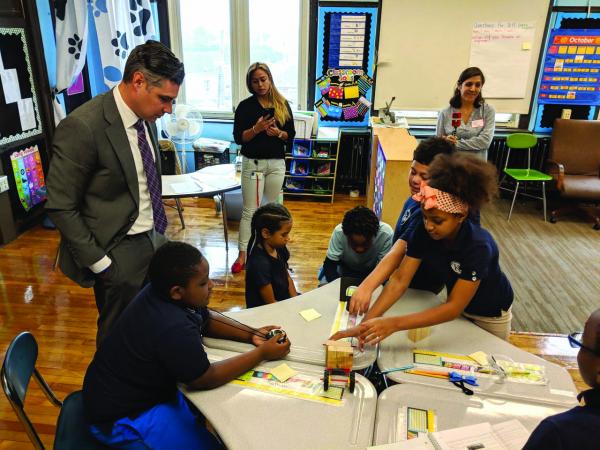October 25, 2018

MBTA deputy general manager Jeff Gonneville visited a classroom at the Kenny School in Dorchester last week as part of an ongoing partnership to encourage third grade students to take an interest in STEM learning paths. MBTA photo
In Massachusetts, jobs in the fields of science, technology, engineering, and math (STEM) are plentiful—but the number of Boston students on track to enter these occupations is not keeping pace.
The National Science Foundation, researchers from Tufts, UMass Boston, and the Boston Public Schools Science Department have partnered with the MBTA to create “ConnecTions in the Making,” a program designed to interest elementary school students in STEM fields and align the BPS curriculum with the 2016 math, science, technology, and engineering standards.
Led by Dr. Kristen Wendell of Tufts and Dr. Tej Dalvi of UMass Boston, the minds behind ConnecTions began by re-working curriculums for third and fifth graders into units that better connected science and engineering.
“Because engineering is now a bigger part of the standards of learning for K-12 science, we wanted to connect science and engineering in a way that showed students how that was relevant for their everyday lives in the communities where they live, and to also show students that they have resources from their everyday lives that they could bring to their science and engineering work in school,” Wendell said.
As Wendell, Dalvi, and a team of teachers looked more closely at these curriculum units during the summer of 2017 in a search for the right lens for these topics, the MBTA came into focus as a familiar institution in the Boston community where science and engineering come together every day.
The T liked the concept and provided researchers with “a couple of real-world scenarios” that were incorporated into these new curriculums, and then pilot-tested during the 2017-2018 school year.
“The idea was that we would be their public partner, and that we would help develop a curriculum to really advance STEM and advance some early education in STEM programs, and obviously help students to foster an interest in stem programs,” said Jeff Gonneville, the MBTA’s deputy general manager.
This year, ConnecTions rolled out the programs district-wide, including elements like a third-grade vehicle design unit, where students propose a design for a subway train or bus that might be more accessible to riders in wheel chairs.
Earlier this month, Gonneville visited the Thomas J. Kenny School near Adams Corner, where he was able to see these initiatives come to life in the science classroom of third grade teacher Maren Wilson.
As the students studied the concepts of how forces cause motion—a basic introduction of statics, dynamics, and engineering—they built small devices out of wheels and Legos, and were able to ask Gonneville, who is a mechanical engineer, questions about his own career.
“The lines of questions ranged from everything about like what my job is like today, but a lot of them focused on when I was their age, what did I like to do and ‘did you like science?’ I talked a lot about how I played with Legos a lot when I was a child, and how I enjoyed taking things apart” Gonneville said. “And there were a number of children in the class who asked various questions related to that.”
The students’ interest delights Gonneville, who sees the importance of STEM careers with clear eyes. Within the MBTA’s 6,500 employees, he estimates that 25 percent are involved in some “form of science, technology, engineering and obviously mathematical based position.”
“And obviously there is a need for not just the MBTA, but really for any of our other industries going forward,” said Gonneville. “So, anything that we can do here at the MBTA to help foster young minds and help students who are teetering on what they might want to do when they get older — to really impress upon them the fun and the excitement that some of these STEM classes and that following career trajectories in the engineering world — is certainly a benefit to all of us.”
The ConnecTion team is now working on their next round of units, this time for a geotechnical engineering module for fourth-grade students that uses the Green Line as an example. ConnecTion will pilot the modules in the 2018-2019 school year, and Wendell is looking forward to that time with relish.
“I’m really excited to get students to see that when they do engineering and science, they can create something that makes the world a better place for different kinds of people,” she said.


